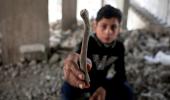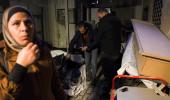As Damascus teetered, Assad's aide orchestrated a shadowy airlift, spiriting millions and secrets to Russia, paving his own escape route.

As the Syrian capital Damascus stood on the edge of collapse in December 2024, President Bashar al-Assad executed a secretive and well-coordinated financial operation to safeguard his personal and regime-linked wealth -- relocating it to Russia under the cover of darkness and diplomatic discretion.
According to a detailed investigation by Reuters, Assad's most trusted aide, economic advisor Yasar Ibrahim oversaw a covert airlift that spanned three days, between December 6 and 8, 2024.
A private Embraer Legacy 600 jet, registered in Gambia under the tail number C5-SKY, completed four round trips between Damascus and Abu Dhabi's Al Bateen executive airport -- a facility noted for its discretion and elite clientele.
Reuters, citing aviation records, intelligence sources, and ground staff testimonies, reported that the jet ferried at least $500,000 in US currency, along with gold, luxury artworks, and digital storage devices.
These devices allegedly contained sensitive financial and ownership data tracing Assad's global financial web -- much of it embedded in Syria's telecom, banking, real estate, and energy sectors.
The Sarajevo Times, which corroborated details from the Reuters expose, further noted that the flights avoided major commercial airports and were coordinated with high-level Emirati intermediaries, ensuring minimal visibility.

On December 8 -- the same day the final evacuation flight departed -- Assad himself fled Syria, leaving from the Russian-operated Hmeimim airbase near Latakia. His destination: Russia, where Watanserb, a Middle Eastern political news outlet, confirmed that President Vladimir Putin granted him asylum hours after his arrival.
This wasn't Assad's first attempt at securing wealth abroad. As uncovered by The Financial Times and later reported by The Moscow Times, Syria's central bank discreetly transported nearly $250 million in hard currency to Moscow between 2018 and 2019.
The transfer -- done in bricks of $100 and €500 notes weighing close to two tonnes -- was quietly deposited in Russian banks, many of which were already sanctioned by the West.
While the operation may have shielded Assad's personal fortune, it has deepened a looming diplomatic standoff.
Syria's new transitional government, led by President Ahmed al-Sharaa, has begun formally pressing Russia to repatriate assets removed under Assad's regime. According to Reuters and Al-Araby Al-Jadeed, the Sharaa administration is also exploring legal pathways to reclaim looted State wealth and renegotiate Syria's massive debt obligations to Moscow.










